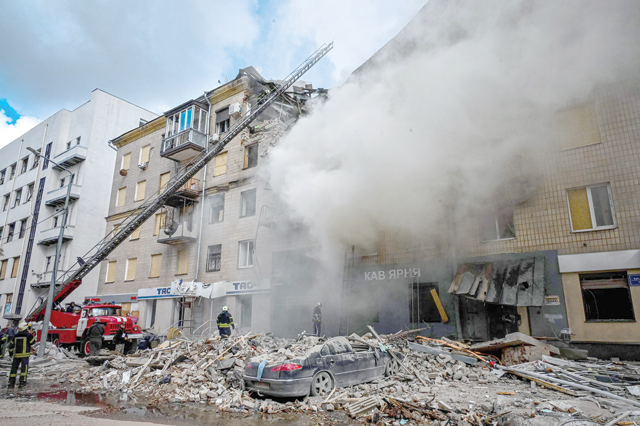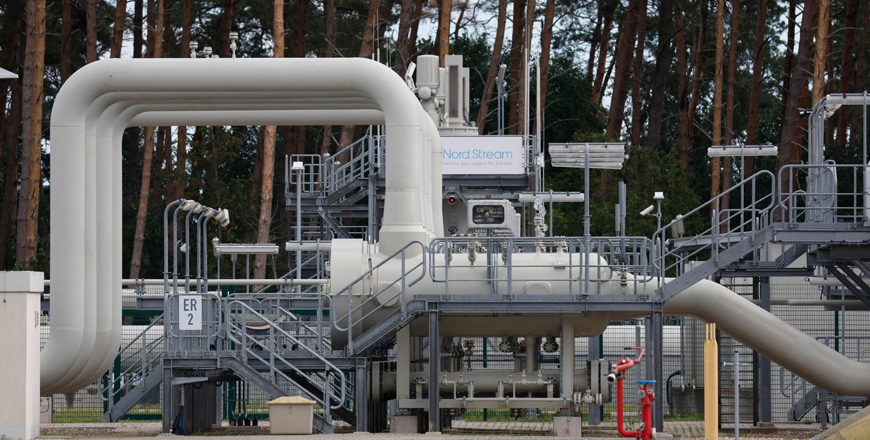You are here
Putin warns 'no gas, no oil' to countries that cap prices
By AFP - Sep 07,2022 - Last updated at Sep 07,2022

Firefighters extinguish a fire after an apartment was hit by a missile strike in Kharkiv, on Tuesday, amid the Russian invasion of Ukraine (AFP photo)
MOSCOW/ BRUSSELS — Russia will stop delivering oil and gas supplies to countries that introduce price caps, President Vladimir Putin said Wednesday.
Capping prices, as some Western countries are considering, "would be an absolutely stupid decision", Putin told the Eastern Economic Forum in the Pacific port city of Vladivostok.
"We will not supply anything at all if it is contrary to our interests, in this case economic [interests]," he said. "No gas, no oil, no coal, no fuel oil, nothing."
G-7 industrialised powers on Friday vowed to move urgently towards implementing a price cap on Russian oil imports, in a bid to cut off a major source of funding for Moscow's military action in Ukraine.
Putin said Russia would respect its contractual obligations and hoped other countries would do the same.
"Those who are trying to impose something on us are in no position today to dictate their will," Putin said.
"They should come to their senses."
Pointing to rising energy prices in Europe ahead of winter, Putin insisted Russia would supply nothing outside of existing contracts, quoting a Russian fairy tale: "Freeze, freeze, the wolf tail."
"They have several solutions. Either subsidising high prices, which is bad because it won't change consumer behaviour... or reduce consumption," he said.
"From an economic point of view, it is correct. From a social point of view it is dangerous, it can lead to an explosion. It is better to adhere to contractual obligations, to civilised rules," Putin said.
Meanwhile, the European Commission proposed a series of measures on Wednesday to control skyrocketing energy prices in Europe and punish Moscow for invading Ukraine, including a price cap on Russian gas.
EU countries are scrambling to face up to a challenging winter ahead, with European consumers facing eye-watering heating bills with natural gas and electricity prices hovering at record levels.
Friday’s announcement by Russian energy giant Gazprom of a complete shutdown of the crucial Nord Stream 1 gas pipeline from Russia to Germany has increased fears of hard months ahead for European households.
Against this threatening backdrop, European energy ministers are to meet on Friday to discuss action, and EU chief Ursula von der Leyen said she had proposed them a series of measures, including a price cap.
“We are facing an extraordinary situation, because Russia is an unreliable supplier and is manipulating our energy markets,” she warned.
“Our unity and our solidarity will ensure that we will prevail,” she added.
Laying out her plan, von der Leyen urged that member states agree a price cap on Russian gas imports, a measure that Putin has warned would be “an absolutely stupid decision”.
“The objective here is very clear. We must cut Russia’s revenues which Putin uses to finance this atrocious war against Ukraine,” von der Leyen, the president of the European Commission told reporters.
Von der Leyen also said that certain European power companies that are benefiting from high power prices would see a levy on their revenue and profits.
Crisis in Europe
She said this will target firms that are producing electricity at low cost, such as wind or nuclear energy companies, but benefitting from the sky-high prices caused by the war in Ukraine.
“Low carbon energy sources are making unexpected revenues, which do not reflect their production costs,” von der Leyen told reporters.
The EU executive will also ask member countries to “re-channel” profits of fossil fuel companies that are seeing historically high revenues thanks to the energy shock caused by the war.
“Oil and gas companies have also made massive profits. We will therefore propose a solidarity contribution for fossil fuel companies,” she said.
The EU’s energy ministers are set to debate the commission’s ideas, with many countries expected to come to the table with their own proposals.
The rotating EU presidency is held by the Czech Republic, and industry minister Jozef Sikela, who will chair Friday’s talks, warned that any price cap on gas could be a distraction from efforts to secure energy supply.
“I think it’s not a constructive proposal,” he told the Czech senate on Wedne sday.
“This is rather another kind of sanctions against Russia than an actual solution to the energy crisis in Europe. And we don’t want to prepare further sanctions now, we want to tackle the energy situation.”
Energy policy in the 27-member European Union remains largely a national competence despite deep interdependence among many of the countries.
Related Articles
CERNOBBIO, Italy — EU Economy Commissioner Paolo Gentiloni said Saturday that the European Union was "well prepared" in the event of a total
WASHINGTON — The United States said on Sunday it was in "active discussions" with European countries about banning Russian oil imports as fu
STRASBOURG, France — The European Parliament on Thursday passed a symbolic vote demanding a total ban on all Russian energy imports into the

















